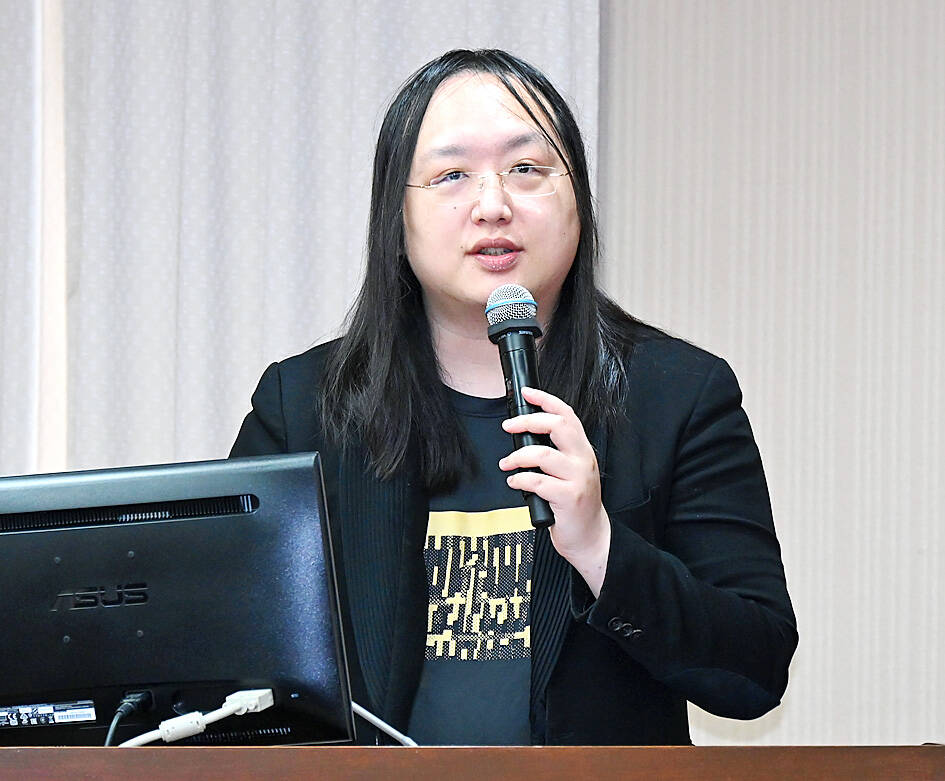The legislature’s Education and Culture Committee yesterday passed a motion requiring the Ministry of Digital Affairs (MODA) to finalize by August a model that would serve as a basis for drafting a news media bargaining law to govern pricing content.
The ministry should make a decision after analyzing similar legislation in other countries, together with bills proposed by legislators on the committee, the motion says.
The committee called a meeting with concerned government agencies after Taiwanese news media associations conducted two rounds of negotiations with representatives of Google and Meta in December last year and in March.

Photo: Chu Pei-hsiung, Taipei Times
Following negotiations in December, Google on March 8 launched a Taiwan News Digital Co-Prosperity Fund, in which it pledged to spend NT$300 million (US$9.78 million) in the next three years to facilitate the digital transformation of Taiwan’s news industry.
Meta rejected any co-prosperity plan.
Democratic Progressive Party Legislator Chang Liao Wan-chien (張廖萬堅) said the dialogue between digital platforms and Taiwanese news media failed to touch on the matter of legislation, which is the core issue.
Google’s co-prosperity fund would only spend NT$100 million per year, which looks more like a public relations fund to appease local news media, Chang Liao said.
“The fund would be managed by the Digital Transformation Association, but we are not certain if it is a credible organization and would safeguard freedom of speech,” he said, adding that the fund should be managed by the government.
Deputy Minister of Digital Affairs Lee Huai-jen (李懷仁) told the committee that all government agencies have agreed that news has value, is related to public interests and should not be treated as a mere commodity.
The co-prosperity fund would not be enough to support local news media, as issues such as a reasonable division of profit between news media and digital platforms must be addressed, he said.
A third round of dialogue is to be held soon after the Digital Transformation Association begins accepting applications for funding from news media outlets, he said.
“We hope the dialogue would also be a way to supervise how the co-prosperity fund is used,” he said.
Meanwhile, the Executive Yuan has tasked the MODA and the Fair Trade Commission to study similar laws in other countries and consider what the best model for Taiwan would be, he said.
The News Media Bargaining Code in Australia makes it mandatory for digital platforms to negotiate over the pricing of content with news media should the two fail to reach an agreement, but such a practice would put small and medium-sized news media in an unfavorable position, he said.
Taiwan’s Copyright Act would have to be completely amended should the nation adopt neighboring rights in the EU copyright law demanding payments from digital platforms for using content produced by news media, he said.
The Ministry of Finance rejected levying a digital tax, Lee added.

Taiwan has received more than US$70 million in royalties as of the end of last year from developing the F-16V jet as countries worldwide purchase or upgrade to this popular model, government and military officials said on Saturday. Taiwan funded the development of the F-16V jet and ended up the sole investor as other countries withdrew from the program. Now the F-16V is increasingly popular and countries must pay Taiwan a percentage in royalties when they purchase new F-16V aircraft or upgrade older F-16 models. The next five years are expected to be the peak for these royalties, with Taiwan potentially earning

STAY IN YOUR LANE: As the US and Israel attack Iran, the ministry has warned China not to overstep by including Taiwanese citizens in its evacuation orders The Ministry of Foreign Affairs (MOFA) yesterday rebuked a statement by China’s embassy in Israel that it would evacuate Taiwanese holders of Chinese travel documents from Israel amid the latter’s escalating conflict with Iran. Tensions have risen across the Middle East in the wake of US and Israeli airstrikes on Iran beginning Saturday. China subsequently issued an evacuation notice for its citizens. In a news release, the Chinese embassy in Israel said holders of “Taiwan compatriot permits (台胞證)” issued to Taiwanese nationals by Chinese authorities for travel to China — could register for evacuation to Egypt. In Taipei, the ministry yesterday said Taiwan

‘LIKE-MINDED PARTNER’: Tako van Popta said it would be inappropriate to delay signing the deal with Taiwan because of China, adding he would promote the issue Canadian senators have stressed Taiwan’s importance for international trade and expressed enthusiasm for ensuring the Taiwan-Canada trade cooperation framework agreement is implemented this year. Representative to Canada Harry Tseng (曾厚仁) in an interview with the Central News Agency (CNA) said he was increasingly uneasy about Ottawa’s delays in signing the agreement, especially as Ottawa has warmed toward Beijing. There are “no negotiations left. Not only [is it] initialed, we have three versions of the text ready: English, French and Mandarin,” Tseng said. “That tells you how close we are to the final signature.” Tseng said that he hoped Canadian Prime Minister Mark Carney

POSITIVE DEVELOPMENT: Japan and the US are expected to hold in-depth discussions on Taiwan-related issues during the meeting next month, Japanese sources said The holding of a Japan-US leaders’ meeting ahead of US President Donald Trump’s visit to China is positive news for Taiwan, former Japan-Taiwan Exchange Association representative Hiroyasu Izumi said yesterday. After the Liberal Democratic Party’s landslide victory in Japan’s House of Representatives election, Japanese Prime Minister Sanae Takaichi is scheduled to visit the US next month, where she is to meet with Trump ahead of the US president’s planned visit to China from March 31 to April 2 for a meeting with Chinese President Xi Jinping (習近平). Japan and the US are expected to hold in-depth discussions on Taiwan-related issues during the